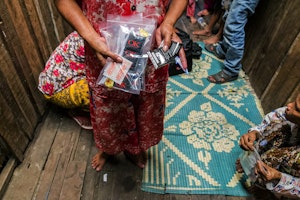Why Are Doctors Still Performing Genital Surgery on Infants?
By Lydia Guterman
Medical researchers have finally provided scientific backing for a truth that advocates have known for years—that performing genital reshaping surgery on intersex children at birth or soon after is harmful. A study in the Journal of Clinical Endocrinology and Metabolism found that large numbers of intersex adults are dissatisfied with the results of childhood genital surgery; the study's authors recommended that surgical decisions be postponed until adolescence or adulthood, when the patient can give informed consent. Despite such conclusive findings and harrowing accounts from young people speaking out about the abuse they experienced at the hands of medical providers, involuntary genital cutting remains routine throughout the world.
A person has an intersex condition, or difference of sexual development (DSD), if he or she is born with a body that is different from what most people expect for a male or female child. Such anomalies can include atypical genitals, chromosomes, or internal sex organs. When a child is born with atypical genitals—whether that means a clitoris that is larger than usual, a penis with a urethra that doesn’t come right to the tip, or genitals that do not look obviously male or female—it is common for doctors to perform genital surgery in infancy to make the genitals look more “normal.” This is done because doctors and parents are distressed by the appearance of atypical genitals, and they believe “normalcy” will make the child's life easier. Often, doctors and parents also believe that making the genitals look more typical will prevent “gender confusion” or homosexuality. By performing involuntary, non-lifesaving surgeries on intersex infants, these perhaps well-intentioned doctors are blatantly violating their patients’ rights and in some cases the law.
Additionally, genital reshaping surgeries often don’t work out as planned. They can cause lifelong physical and psychological pain, scarring, lost sexual sensation, and many other problems. Sometimes the procedures also involve involuntary sterilization. Sometimes the child rejects the gender assignment, and these surgeries are not reversible. Intersex adults who have lived through these procedures argue that only the affected person can decide whether to take on these risks, and they believe—like the study’s results conclude—that genital reshaping surgery should not be done until the child is old enough to participate in the decision-making process.
Thanks to the work of an emerging cadre of advocates for people with intersex conditions or DSD, standards of care are starting to change. An international consensus statement by medical professionals recommends a more restrained approach to genital surgery. It also recommends telling patients and parents the whole truth about their condition and treatment, which has not always been the practice. Doctors and parents are now questioning the wisdom of early genital surgery, and the practice is increasingly considered controversial (but it is still widely done).
Many parents report that they were not given full information when asked to make medical decisions for their intersex children, particularly about the controversies around genital surgery. Advocates for Informed Choice (AIC) is one leading legal advocacy group working to make sure that parents receive complete information and that the rights of children with intersex conditions are protected when medical decisions are being made. Part of this work is to make sure that doctors know that some involuntary procedures commonly performed on children with intersex conditions are in fact against the law. Another part is to help their clients recover from the abuse they suffered masquerading as medical care.
A few years ago, an intersex woman approached AIC with a request. She was born with atypical genitals as a result of a medical condition. In an effort to make her look like a “normal” girl, her doctors had removed her clitoris in infancy. They told her parents never to tell her what had happened. Throughout childhood she was exposed to humiliating displays at the teaching hospital where she was treated, being made to show her genitals to one resident physician after another. Such treatment was standard for children like her. As an adult, she decided to take action to be sure that nothing like this happened again. She didn’t ask to sue her doctors, though. She wanted an apology.
AIC asked the hospital workers to listen to the woman’s story. At first they were defensive. They argued that they had done their best for the patient and followed accepted protocols. After extensive negotiations, two leading hospitals and the prominent physician who had overseen her care recognized that she had suffered real harm as a result of her treatment, and they offered sincere expressions of regret. To our knowledge, these are the first such apologies. Unexpectedly, the physicians involved in this process are taking action on their own to improve care, to be more aware of privacy issues, and to reduce unnecessary interventions. Hearing her story and the act of apology helped them to see intersex patients in a new way.
The Campaign to Stop Torture in Health Care, a coalition led by the Open Society Foundations, recently applauded AIC founder and executive director Anne Tamar-Mattis for her work in exposing the degrading and abusive medical treatment of intersex children. We hope the medical community will take a step back to read the latest studies and listen to the voices of advocates and patients themselves.
Until March 2013, Lydia Guterman was a program officer for the Public Health Program of the Open Society Foundations.

